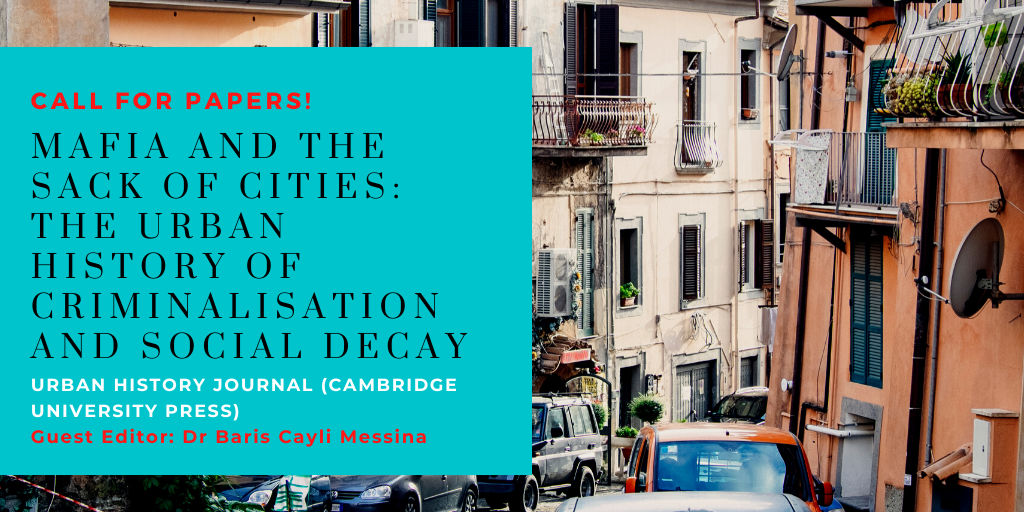
The Sack of Palermo is a notorious term defining how the city was ruined through mafia-allied contracts in the 1950s and the 1960s. The loss of architectural distinctiveness in the capital city of Sicily and growing political-criminal nexus have augmented urban degeneration in the following decades. Yet Palermo is not an isolated case in the social decay of urban life. Mafia organizations engaged illegal activities, destroyed the urban environment, dominated the construction sector, and extorted money from shopkeepers throughout history. This formidable amalgam of urban crimes created by different mafia groups across the world plundered different cities dramatically, changed architectural landscape, increased inequality gap, threatened powerless groups, and created a culture of lawlessness. We cannot think the mafia independent from other factors such as rapid urbanization, globalizing capitalism, corruption, and limited social mobility of certain people in cities. All these factors foster mafia organizations to sack cities and shape severely everyday life of people who are subject to different levels and types of injustice. Thus, the sack of cities by different mafia groups becomes a grim reality of criminalization and social decay in which complex power hierarchies and strategic networks need to be exposed, resolved, and sometimes eliminated.
This special issue aims to contribute to our knowledge on asymmetrical conflicts in urban life by centralizing mafia groups and their power in cities across the world. In this special issue, we aim to create a unique theoretical perspective on criminalization and social decay in urban history by exploring mafia activities. In doing so, the special issue aims to push past existing frameworks through using sociological, anthropological, political, historical, and criminological lenses and connecting the past with the pressing issues of our time.
A workshop will be organized on 23 April 2020 at the University of Derby with the support of Urban History Journal (Cambridge University Press). The presenters after the workshop will be invited to send their papers BY 30 July 2020 to be considered for a special issue in Urban History. The special issue will be published in 2021. Modest travel expenses of the participants attending to the workshop will be covered. Tea/coffee and lunch will be provided.
We welcome articles on a broad range in both geographic and chronological terms, including local, regional, national and/or global foci. We particularly seek papers up to 8,000 words which are intellectually challenging and covering works from different parts of the world. We would like to invite potential contributors who explore mafia activities and advance our theoretical, methodological, and empirical knowledge on criminalization and social decay in urban life. Some of the potential themes are listed below, but the themes are not limited to it:
- Mafia and Urban Crime: Authority and the Control of Cities in History
- Mafia and Corruption: The Mafia-Allied Contracts in the Construction Sector
- Organized Crime in the Slums after the World War II
- The Infiltration of the Mafia into the State Institutions and the Destruction of Cities
- Eco-Mafia and the History of Environmental Crimes in Cities
- Global Mafia in Globalized Cities: Transnational and Invisible Networks after 1989
- Extortion of the Shopkeepers: The Economic Life in Unsafe Cities
- Urban Journalism against the Mafia: Reporting Crimes and Defending Cities
- How the Mafia Sacks Cities: Archival Research on Mafia Groups in Urban Degeneration
- Mafia and the Anthropology of Social Decay in City Councils
- Mafia Groups in the Cities of the Global South
- The Migration of the Mafia between Different Cities
- Rapid Urbanization, Gentrification, and the Mafia
- Urban Resistance against the Mafia in Contemporary History
Authors must address the guest editor and clearly indicate that their submissions are intended for the workshop and special issue. If you are interested in attending workshop and contributing to this special issue in Urban History Journal please get in touch with the guest editor, Dr Baris Cayli Messina via b.cayli@derby.ac.uk and send your abstract (250 words) by 30 March 2020. The workshop will be held at One Friary Gate Square, University of Derby on 23 April. Attendance to the workshop is highly encouraged. Skype attendance will be considered. Full article submissions are due to July 30, 2020.
All submitted articles will be subject to double blind peer review process before publication.
**Sponsored by Urban History and University of Derby**


